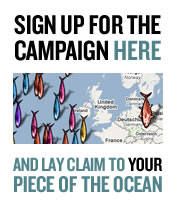Film review: The End of the Line
 I admit it, I’m no film critic. Robert Ebert has absolutely nothing to fear from me!
I admit it, I’m no film critic. Robert Ebert has absolutely nothing to fear from me!
But like millions of people, I am interested in eco-issues so when I’m asked to take a look at books or films on the topic, I’m happy to oblige and offer my opinion and input from the perspective of someone who is involved and always looking to learn.
Recently, I was offered the video of The End of the Line to review. An “official selection” at a number of film festivals, The End of the Line is an eye opener for anyone who has not contemplated the future of fish beyond the increasingly limited restaurant choices.
The ocean covers 71 percent of the Earth’s surface and contains 97 percent of its water. One in every six jobs in the U.S. is marine-related and over one-third of the U.S. GNP originates in coastal areas. Millions of people depend on the ocean’s bounty to provide a livelihood as well as food for the table.
But watch The End of the Line and you will quickly realize that we already are in the midst of a cataclysmic catastrophe that, if not stopped, will leave fish populations decimated, millions of people hungry and job lists without the category-”fisherman.”
The film is depressing. How can it be anything else? How can we feel anything but dread at the realization that the oceans, the lifeblood of the planet, of food and commerce, may soon be a watery desert where so little life survives that it cannot sustain itself much less humanity?
This is a frightening tale, another in the litany of disregard for the natural order. It seems blindingly obvious that over fishing will result in the death of the species. You can’t drag with nets the size of football fields forever.
It has in fact, been projected by scientists that if something, many things, are not done, by 2048, the ocean could be mostly devoid of fish.
As horrific as this idea is, I ask you not to turn your back on one more impending disaster because the answer to this one is not completely out of our hands.
The End of the Line can serve as a wake up call to this life altering challenge to save the seas.
Hope, according to the film, lies not with governments or companies (which may be working, but very slowly), but with individuals. Like many aspects of the ecological crisis, we need to speak with our wallets. The reason for the problem lies in our hunger for fish which leads to over fishing. Not all that complicated really. When we stop demanding, requesting, requiring fish that are on the verge of dying as a population; learn about where the fish we choose to eat comes from; and support sustainable fishing, we can make a difference.
For a free guide to sustainable seafood, go here. Print it out, put it in your wallet and check it before buying fish or ordering at a restaurant. And as a bonus, here’s the new Super Green List.
If you want more education about this issue, buy, rent or borrow The End of the Line.
Are you personally concerned about this issue? Tell us why and what you’re doing about it.




 Twitter
Twitter
 LinkedIn
LinkedIn

